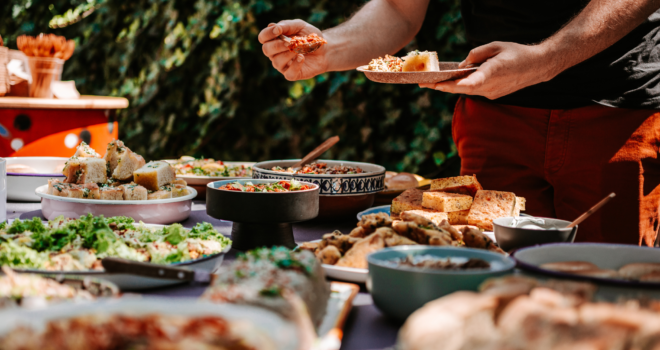Discover how magical thinking influences our food choices: between cultural beliefs, psychology and the transition to sustainable eating!
Vegetarians are said to have “turnip blood”, red meat protein allegedly makes you “stronger”, and fish is supposed to make you “smarter”. These ideas stem from magical thinking – a universal phenomenon that shapes our relationship with food and could help foster the development of sustainable eating habits.
What is magical thinking?
Magical thinking is the idea that “you become what you eat”. It’s based on ancient, instinctive reflexes in which our brains make symbolic links between foods and their supposed effects. That’s why, for example, we instinctively recoil at the idea of drinking a glass of milk if a cockroach has fallen into it (law of contagion), or why we attribute to a food (and by extension, to the person who eats it) the qualities of the animal or plant from which it comes (law of similarity). Over time, this magical thinking has given rise to a variety of beliefs: “to be a man, eat manly foods; to grow tall, eat plants that grow fast; to be brave, avoid the meat of cowardly animals…”, as sociologist Claude Fischler1 puts it. Magical thinking is what continues to fuel the aura around animal protein (particularly red meat), which is said to bring strength and vigour, whereas vegetable protein is seen as more “lightweight”.
Did you know? In New Zealand korimako (a bird known for its melodious song) was fed to children destined to become chiefs, so that they would grow up eloquent and become skilled orators.2
Read also : Nuts: Breaking Down the Subject – Benefits, Consumption, Recipe Ideas
A universal phenomenon
Although magical thinking can, in theory, be overcome by reason, it remains incredibly powerful – and universal. The experiments conducted by the American psychologist Paul Rozin are often cited in this context3. In one, Rozin asks his students to drink a glass of fruit juice with a fly in it: the offer is totally rejected, even if the fly is dead and sterilised, or made of plastic! The same goes for bottles of sugar labelled “sugar” or “cyanide”: even though the students know that they all contain sugar, they are far more trusting of the former than the latter. In other words, rational thinking does not erase magical thinking; the two coexist, and our view of food is shaped by both scientific facts and deeply-held beliefs.
Fun fact : Carrots are rich in vitamin A, and are reputed to be good for your eyesight. During the Second World War, the British drew inspiration from this idea to make people believe that the accuracy of their pilots during night raids was down to high consumption of carrots, thus concealing the country’s advanced radar technology..4
The myths surrounding plants… ready for reinvention?
Like all foods, plant-based ingredients come with their own share of myths and beliefs shaped by this famous magical thinking. Some of these ideas are deeply ingrained, and can slow the much-needed shift toward a more plant-based diet. For example, many people still think that men need to eat meat to be strong, or that a “vegetarian meal” is automatically lighter and less nourishing than a dish containing meat.
But we have the power to develop our imagination, to reshape our relationship with living things and move towards a sustainable and harmonious world5. On our plates, this means reinventing the stories we tell about plant-based food. It can start with the words we use: instead of saying “vegetarian”, what about using more descriptive and enticing names such as “creamy lentil lasagne” or “melting red bean parmentier”? Advertisers have long understood this. “We no longer buy oranges, we buy vitality”, as Aldous Huxley put it in his essay “Brave New World Revisited”.
Sources :
- Colloque « Pensée magique et alimentation d’aujourd’hui ». Paris, 1994
- L’alimentation pour se relier à la biosphère. Chaire Unesco – Alimentations du Monde
- Penser l’alimentation. OCHA, 2002.
- La légende des carottes qui font mieux voir dans le noir, de la géniale propagande de guerre britannique. GEO, juin 2023
- Comment faire évoluer nos imaginaires pour changer nos relations au monde vivant et aller vers un monde soutenable et harmonieux ? de Jules Colé. Ademe, 2022
Find out more:
- « Pensée magique et utopie dans la science ». Claude Fishler, 1996.
- Colloque « Je suis ce que je mange ». Chaire Unesco – Alimentations du monde, 2016



 Vegetable garden: growing artichoke
Vegetable garden: growing artichoke 









